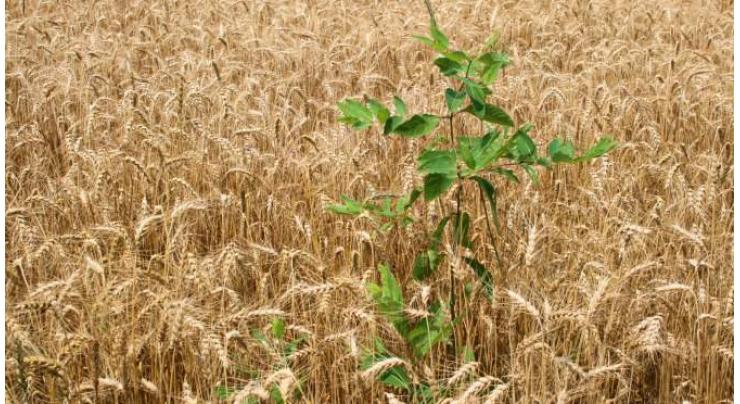
Faisalabad Agriculture University Develops Technology To Control Wheat Weeds
Sumaira FH Published April 24, 2019 | 04:52 PM

A cost-effective technology for application of bioherbicide to the crops has been developed under public-private partnership to control weeds of wheat and increase its production
ISLAMABAD, (UrduPoint / Pakistan Point News - 24th Apr, 2019 ) :A cost-effective technology for application of bioherbicide to the crops has been developed under public-private partnership to control weeds of wheat and increase its production.
The initiative was taken by the University of Agriculture, Faisalabad in collaboration with Jaffer Agro Services which was later approved and undertaken by the Higher education Commission (HEC) under Technology Development Fund (TDF), the Project Director Professor Zahir Ahmed Zahir told APP.
He said, since the wheat was Pakistan's major crop, it was witnessing 40 per cent decline in its annual production due to the weeds which grew on its own during cultivation process, causing Rs.37.9 billion loss to the country's economy.
Zahir said he along with his team developed the technology and prepared a Bioherbicide containing Allelopathic Bacteria for Bio-control of Weeds of Wheat.
The Professor said they had already identified useful strains of rhizobacteria, a root-colonizing bacterium suitable to develop a bioherbicide, which may be applied to wheat crop through the technology and a specified process.
The coating of wheat weeds with the bacterium would help suppress the growth of those wild shrubs in crops, he added.
At present, he said, various weed control strategies were being employed, including manual weed control, which were proved time consuming and labour intensive.
The manual weed control strategy was not only suitable for crops grown in rows but also elevate the cost due to high energy inputs, he said and added that chemical control was time-saving and cost-effective, but it caused harmful environmental impacts, destroying beneficial organisms, pollinators, terrestrial and aquatic life in different ways.
Zahir said field trials of the technology conducted in collaboration with the industrial partner had already proven its ability to suppress weed growth and increased wheat growth by more than 15 per cent.
He said the technology would be offered to farmer community in a user-friendly form by the nest season.
Zahir believed that over 567 tons of wheat crop yields worth Rs.18.44 million annually may went up by applying bioherbicide to only 15 per cent of total area under wheat cultivation.
He said three million rupees could also be saved from import of harmful insecticides and pesticides in addition to other multiple benefits to biodiversity, ecosystem and economy of the country, \778
Related Topics
Recent Stories

Bugti assures transporters for addressing their problems

Deputy Prime Minister and Foreign Minister, Mohammad Ishaq Dar meets foreign min ..

3 drug peddlers arrested, hashish recovered

1496,990 children given polio drops in five days: DC

Six terrorists killed, hideout busted in N Waziristan IBO: ISPR

Pakistan, Qatar agree to further expand trade, investment ties

Sindh cabinet approves Rs177.5m to strengthen, mobilize various wings of police

Faisal Karim Kundi takes oath as new KP Governor

Azad Jammu and Kashmir Prime Minister Anwaar ul Haq Chaudhry seeks more vibrant ..

Tahaffuz Manzil Foster Home providing care & support to homeless children

PCB proposes April 7 -May 20 window; tweaks in rules for HBL PSL 2025

Field hospitals now operational across Punjab: Azma Bukhari
More Stories From Agriculture
-

UoA, Beijing Engineering Research Center for Hybrid Wheat sign MoU to promote mutual coop
8 days ago -

'Transforming Punjab Agriculture' plan to help develop farm sector on modern lines: Punjab Agricultu ..
9 days ago -

DC for immediate distribution of agricultural fertilizer to farmers
10 days ago -

MNAs for favorable wheat procurement terms to benefit farmers
10 days ago -

Farmers should preferably complete cotton sowing by May 15, say experts
11 days ago -

Livestock dept, PCS to hold poultry expo from April 30
18 days ago
-

Farmers advised to adopt pre, post harvest management for wheat crop
19 days ago -

Farmers must complete all arrangements prior to wheat harvesting
21 days ago -

Wheat Harvest: Agri deptt issues certain guidelines
22 days ago -

1,800 agricultural equipment to be provided to 710 farmers: secretary
28 days ago -

Steps must be taken for promotion of agriculture sector in Balochistan: Qadir
28 days ago -

Govt working to increase agriculture production in merged districts: KP Minister
30 days ago











